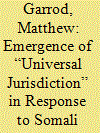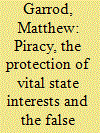|
|
|
Sort Order |
|
|
|
Items / Page
|
|
|
|
|
|
|
| Srl | Item |
| 1 |
ID:
170428


|
|
|
|
|
| Summary/Abstract |
Since the 1980s, the idea that piracy is the “original” and “paradigmatic” universal jurisdiction crime in customary international law has been increasingly supported by weighty scholarship. In the wake of the unprecedented surge in Somali piracy, this view is gaining ground among various powerful actors in international law. Yet, remarkably little empirically grounded scholarship exists in support of universal jurisdiction. This Article provides the first comprehensive empirical analysis of state practice in response to Somali piracy in a ten-year period since 2006. Additionally, the data on Somali piracy are compared with the empirical findings of state practice regarding international crimes, which are more “heinous” than piracy, since the end of World War II to 2016. In so doing, this Article brings new insight and the first thorough critique of what most scholars, governments, the UN and even the International Court of Justice have said on universal jurisdiction, its purpose and the basis for it in international law. In view of inter-state tensions and conflict caused by universal jurisdiction and a move towards law codification, there is now a pressing need for a paradigm shift in the concept of universal jurisdiction for both piracy and international crimes, a step away from conventional scholarly accounts, and the grand narratives from which they proceed, to a position that has a solid basis in the actual practice of states. Empirically and historically informed, it is proposed that “universal jurisdiction” for both categories of crime provides a basis in international law permitting the exercise of national criminal jurisdiction over offences involving foreign nationals abroad that have a close nexus between the case over which jurisdiction is asserted and the state asserting jurisdiction. Common and traditionally held assumptions that universal jurisdiction is based solely on the grave nature of crimes and is applied by states absent any nexus to offences and in the interest of the international community are unfounded.
|
|
|
|
|
|
|
|
|
|
|
|
|
|
|
|
| 2 |
ID:
188012


|
|
|
|
|
| Summary/Abstract |
One of the most important legacies of the “Troubles” in Northern Ireland and the ensuing 20 years post-peace-process era, heralded by the 1998 Good Friday Agreement, is the rise of complex and diverse Republican and Loyalist paramilitary groups engaging in acts of terrorism and a wide range of organized criminal and cross-border activities. Yet, little scholarship has been dedicated for examining the nexus between terrorism and organized crime in Northern Ireland or for accurately understanding the role that paramilitaries play in organized crime and their dynamic interactions with organized criminal groups. Informed by empirical evidence and qualitative interviews with government agencies in Northern Ireland, it is this important gap in scholarship that this article aims to fill. It does so by developing a new terrorism-organized crime model which reveals a range of different types of crime-terror interactions in Northern Ireland. The article concludes that national terrorism-organized crime models, and the Northern Ireland model in particular, albeit with variations to its constituent components to accommodate local situations, are most appropriate for capturing intricate and dynamic interactions between these two phenomena across diverse environments rather than existing models designed for universal application.
|
|
|
|
|
|
|
|
|
|
|
|
|
|
|
|
| 3 |
ID:
132410


|
|
|
|
|
| Publication |
2014.
|
| Summary/Abstract |
It is widely asserted by courts and in legal scholarship that for hundreds of years universal jurisdiction has applied to the crime of piracy. However, the alleged historical legal foundations of universality need challenge. The central argument of this analysis is that jurisdiction over "piracy" is better understood under the protective principle, which arose out of the necessity of maritime Powers roughly between the seventeenth and eighteenth centuries to protect certain of their vital interests, not least their overseas trade routes and colonial trade and settlements. It follows that there is a need to re-conceptualise jurisdiction over piracy as the protection of vital State interests shared by the international community, a concept misinterpreted as universal jurisdiction.
|
|
|
|
|
|
|
|
|
|
|
|
|
|
|
|
|
|
|
|
|